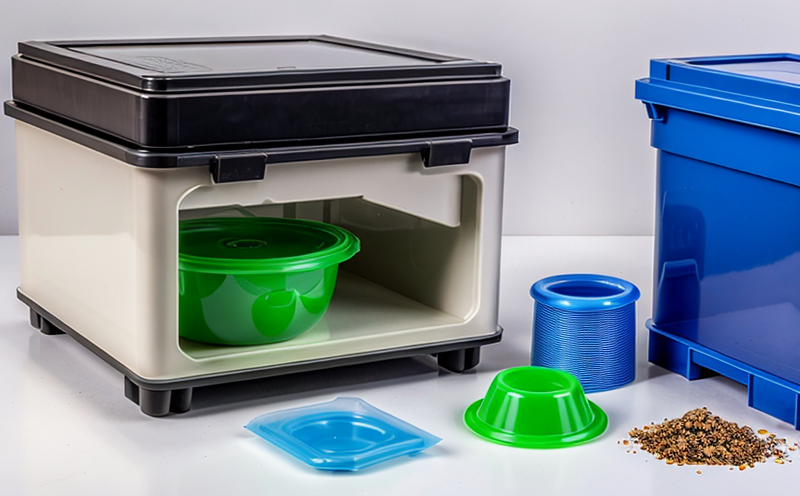ISO 534 Plastics Packaging Thickness Testing by Mechanical Method
The ISO 534 method is a fundamental standard used globally to measure the thickness of plastics packaging materials. This mechanical approach involves precise measurements using calibrated instruments, ensuring accurate and reliable results that are essential for quality control in the plastics industry.
Accurate measurement of plastic material thickness directly impacts product performance, safety, and compliance with regulatory standards. For instance, thinning or thickening can affect barrier properties such as permeability to gases, moisture, and odors. In packaging applications, these properties are critical for maintaining the integrity of the packaged goods.
The ISO 534 method is particularly relevant for testing films, sheets, and other plastic materials used in various types of packaging, including food packaging, medical devices, and consumer products. The mechanical nature of this test allows it to be performed on a wide range of plastics, including polyethylene (PE), polypropylene (PP), polystyrene (PS), and more.
Before testing, proper specimen preparation is crucial. Specimens must be representative of the materials being tested and should be cut into uniform strips or pieces. The choice of cutting method can influence measurement accuracy; therefore, it’s important to ensure that the specimens are free from defects such as air pockets or uneven thicknesses.
The mechanical testing process involves placing the specimen between two anvils in a thickness gauge. This gauge applies controlled pressure and measures the distance between the anvils, which directly corresponds to the material's thickness. The gauge must be calibrated regularly to ensure consistent and accurate readings.
After acquiring multiple measurements from various points on the specimen, statistical analysis is performed to determine the average thickness of the material. This process ensures that any variations within the sample are accounted for, providing a comprehensive assessment of the packaging's overall quality.
The results of ISO 534 testing are critical for several stakeholders:
- Quality managers ensure consistent product performance and compliance with specifications.
- Compliance officers verify that products meet regulatory requirements such as those set by the FDA or other relevant authorities.
- R&D engineers refine formulations to improve barrier properties and reduce material usage, thereby enhancing sustainability efforts.
- Procurement teams select suppliers who can consistently deliver materials meeting specific thickness criteria.
Why It Matters
The accuracy of ISO 534 testing is not just about ensuring that the packaging meets physical specifications; it also plays a vital role in environmental and economic sustainability. By maintaining consistent thickness, manufacturers can optimize material usage, reducing waste and lowering production costs.
Consistent thickness ensures that packaging provides adequate protection for the contents, which is crucial for food safety regulations such as those provided by the FDA or EU standards like EN 13427. Properly protecting products from contamination and degradation during storage and transport can significantly extend shelf life and reduce spoilage rates.
The mechanical method of ISO 534 testing also supports recycling efforts, as accurate thickness data helps in designing more efficient recycling processes. Understanding the exact composition of plastic components allows for better sorting and processing, ultimately improving the quality of recycled materials.
Additionally, this standard contributes to reducing environmental impact by promoting the use of thinner yet stronger packaging solutions. Thinner films can lead to reduced weight and volume in waste streams, contributing positively to landfill management and resource conservation efforts.
- Reduction in material usage: Consistent thickness ensures that only necessary amounts of plastic are used, minimizing waste generation.
- Improved recycling efficiency: Accurate data on packaging thickness aids in optimizing the recycling process and enhancing the quality of recycled plastics.
Eurolab Advantages
EuroLab stands out as a premier provider of ISO 534 testing services, offering unparalleled expertise in this critical area. Our team of experienced professionals ensures that each test is conducted according to the strictest international standards.
We employ state-of-the-art equipment and calibrated instruments to guarantee precise measurements every time. Our laboratories are equipped with advanced thickness gauges and other necessary tools for specimen preparation, ensuring that our clients receive accurate results they can trust.
Our commitment to quality is reflected in the reliability of our test results. Whether you need periodic quality assurance checks or one-off testing services, EuroLab delivers consistent and accurate measurements every time. Our experienced engineers are adept at handling a wide range of plastic materials, from simple polyethylene films to more complex multi-layered structures.
Moreover, we provide comprehensive reporting tailored to your specific needs. This includes detailed data on the thickness distribution within each specimen, statistical analysis, and recommendations for process improvements where necessary. Our reports are designed to be easy to understand and actionable, helping you make informed decisions about your packaging materials.
Client satisfaction is at the heart of everything we do. We offer flexible appointment times to accommodate busy schedules, ensuring that our clients can have their tests conducted whenever it’s most convenient for them. Our friendly and knowledgeable staff are always ready to assist with any questions or concerns you may have during the testing process.
At EuroLab, we understand the importance of ISO 534 testing in maintaining high standards of quality and compliance. With our extensive experience and cutting-edge facilities, we provide a reliable service that meets the specific requirements of various sectors, including food packaging, pharmaceuticals, and consumer goods.
Environmental and Sustainability Contributions
- Reducing material waste: Consistent thickness measurement ensures that only necessary amounts of plastic are used in the production process, minimizing waste generation.
- Enhancing recycling processes: Accurate data on packaging thickness aids in optimizing the recycling process and improving the quality of recycled plastics.
- Supporting thinner yet stronger solutions: By promoting the use of thinner materials with enhanced strength properties, ISO 534 testing contributes to reducing environmental impact through reduced weight and volume in waste streams.





